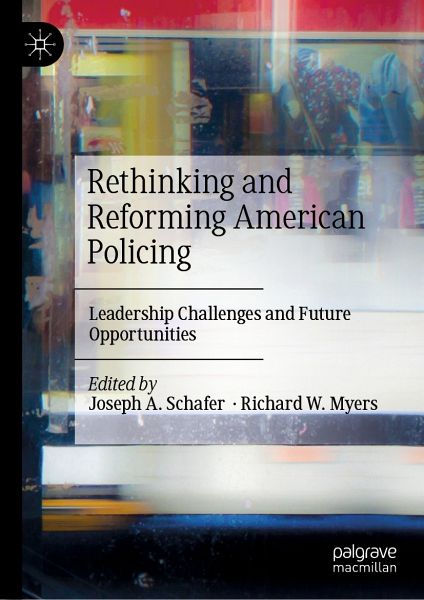
Rethinking and Reforming American Policing (eBook, PDF)
Leadership Challenges and Future Opportunities
Redaktion: Schafer, Joseph A.; Myers, Richard W.
Versandkostenfrei!
Sofort per Download lieferbar
104,95 €
inkl. MwSt.
Weitere Ausgaben:

PAYBACK Punkte
52 °P sammeln!
Policing in the US and many western nations is in an era of crisis, facing extensive calls for reformation and change. This edited book outlines the major challenges and changes needed to achieve a more stable future for the policing profession and police organizations. The chapters come from innovative police leaders and officers as well as academics with subject matter expertise, to provide insight into how reform can be done with the police. It focusses on how leaders should understand and approach their role during times of instability and uncertainty. It starts with an examination of how ...
Policing in the US and many western nations is in an era of crisis, facing extensive calls for reformation and change. This edited book outlines the major challenges and changes needed to achieve a more stable future for the policing profession and police organizations. The chapters come from innovative police leaders and officers as well as academics with subject matter expertise, to provide insight into how reform can be done with the police. It focusses on how leaders should understand and approach their role during times of instability and uncertainty. It starts with an examination of how policing reached this state of crisis and discusses some interviews conducted with police leaders, particularly chiefs as agents of change and reform. This is followed by chapters from several veteran police leaders and personnel describing some of the factors that brought policing to this critical time of change and reform, how has policing evolved in the late 20th and early 21st centuries, and how that impacts the current environment, and some potential strategies to create meaningful change while considering unintended consequences. The following chapters from academics seek to define paths that policing can take toward needed changes that will increase legitimacy, trust, and equality of policing services. It speaks to students, academics and professionals interested in police organization and administration, police leadership, and contemporary issues in policing and criminal justice.
Dieser Download kann aus rechtlichen Gründen nur mit Rechnungsadresse in A, B, BG, CY, CZ, D, DK, EW, E, FIN, F, GR, HR, H, IRL, I, LT, L, LR, M, NL, PL, P, R, S, SLO, SK ausgeliefert werden.












